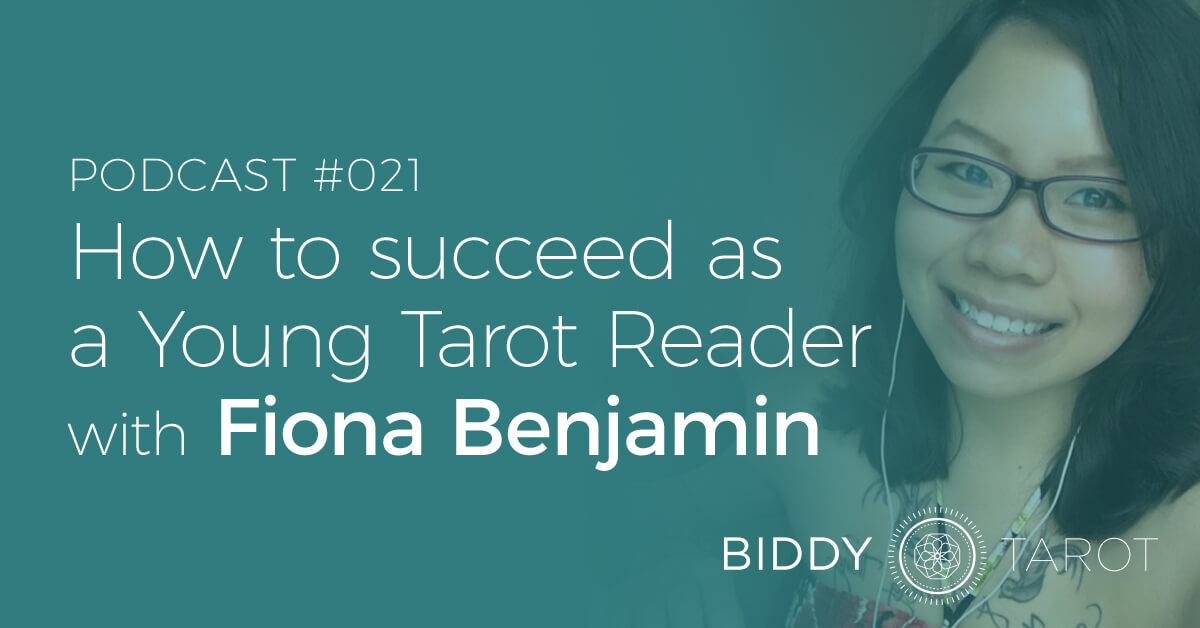
ding for other people, but there was just one problem: I didn't look like most other Tarot readers, who were at least 20 years older than me!
I had to figure out how I could still maintain credibility with my clients despite my age.
Well, it turns out I'm not alone. My guest today, Fiona Benjamin, learned to read Tarot at 12 and started reading professionally at just 21. She hasn't let age get in the way and has since created a successful online Tarot business – the Modern Fortune Teller – serving clients from around the world.
In this podcast episode, you'll learn:
- How a strange and unique gift from Fiona's mum spurred an avid interest in Tarot
- How to steer clear of getting addicted to your Tarot deck
- Why just being yourself is essential for any Tarot reader, at any age
- 3 success tips for young Tarot readers who are just starting out
- Why it's critical not to let social media and public opinion get into your head
Let's get into it! (And please excuse my croaky voice throughout the interview!)
[Tweet “How to succeed as a young Tarot reader with @biddytarot”]Additional Resources
Podcast Transcript
You’re listening to the Biddy Tarot Podcast, and this is Episode 21: How to Succeed as a Young Tarot Reader.
Voice-Over
Welcome to the Biddy Tarot podcast, where you will learn how to connect more deeply with your intuition and live an empowered and enlightened life with the Tarot cards as your guide.
Listen as Brigit and her guests share their very best tips and strategies to help you read Tarot with confidence.
And now, here is your host Brigit Esselmont.
Introduction
Hello and welcome back to the Biddy Tarot podcast.
Yes, it is still me, it’s Brigit – I just have this awfully croaky voice today, but I was so excited about having this particular podcast and our guest today, that I had to keep going with this podcast. So I hope that you can put up with this croaky voice.
So let’s get right into it.
When I first started to read Tarot I was just a fresh-faced 18 year old. And by my early 20s I was ready to start reading for other people, but there was just one problem: I didn’t look like most other Tarot readers who were at least 20 years older than me.
So I had to figure out how I could still maintain credibility with my clients, despite my age.
Well, it turns out that I’m not alone. Today’s guest learn to read Tarot at 12, and started reading professionally at just 21.
She hasn’t let age get in the way, and has since created a successful online Tarot business serving clients from around the world. She’s the founder of the Modern Fortune Teller, creator of the Lunar Fire deck, and mum to two beautiful boys; she is none other than Fiona Benjamin.
Welcome, Fiona!
Fiona Benjamin: Thank you very much, Brigit.
Brigit: It’s so good to have you here, and again I’m very glad we’re having an interview today because I think it would be very hard to listen to this voice for about 25 minutes.
Fiona: Yeah.
Brigit: So a big welcome – get us started – I would love to hear what is it that drew you to Tarot in the first place when you were that young age of 12?
Fiona: I think I grew up in a family that was – we were Buddhists growing up, so my parents were very open to the metaphysical, no matter what it was.
When I was about six or seven years old my mother actually bought me my first Ouija board, so Divination was something I was always really attracted to, and I loved the Occult.
So naturally when they started carrying Tarot decks, and I think it was called Borders, the bookstore in the mall – so when they started carrying those types of decks, naturally I was drawn to them. I went to check them out.
I knew what they were – kind of like a source of fortune telling or something like that – and being in middle school, or heading into middle school around that time, of course I wanted to grab the cards and at first it was a very: Oh, I have a deck of cards, let’s see what that boy thinks about me.
Or my girlfriends would ask my, “Oh you know, bring your cards. I want to know if this guy is going to ask me to the dance.”
And it was just such a silly little thing when I was younger, but it was a consistent theme throughout my life like I could always consult the Tarot deck. And I put it down for maybe several months at a time, maybe for a year, or a year and a half, I would put the deck of cards down, but when I hit rock bottom, or when I felt I needed answers, or I couldn’t speak to anyone, I always came back to my deck of cards and I would ask the questions. And I would just open up the little white book and mix and match the cards and the replies, and that’s basically how I got started and what drew me to the cards.
Brigit: Wonderful.
And these days how do you interact with Tarot on a daily basis?
Fiona: Oh, that is a loaded question because – it drives my husband crazy, but I have a deck of cards in probably every room in the house.
There’s one in the kitchen; there’s one in the bedroom – I have to be careful about leaving them in the bathroom. I have one on my cell phone App.
I could literally be heading somewhere and a question would pop up in my head, or an idea would pop up, or my husband would ask me, “Hey, let’s invest money into a new couch,” or, “Let’s buy a new car,” and I would flip on my App, on my cell phone, and ask the cards, and have it virtually shuffle the cards for me, and I would use that answer to kind of be like: Should I invest money in a car?
So Tarot – I wouldn’t say I’m dependent on Tarot – I highly take it into consideration.
It’s like my right-hand man. You ask him for advice, you might not always listen, and sometimes it bites you in the butt when you don’t listen, but Tarot definitely is something I turn to when I’m in need.
Brigit: Yeah, and I think this question around dependency on Tarot comes up a lot, especially for folks like us who do use Tarot so frequently – how do you think it is you stop it from becoming dependency or an addiction?
Because I’ve certainly seen that happen with some folks – can’t make a decision until they check their Tarot cards. So what make it different for you?
How is it healthy for you?
Fiona: I think I have a relationship with Tarot because while I ask the question I feel like the addiction comes in where you start re-phrasing the question over and over, trying to get a different answer.
Or when you try: Well, this deck of cards isn’t really giving me what I want, let me grab another deck of cards; or let me even consider another oracle system; let me go buy a reading.
I think, with respect to the Tarot, ask a question, and it doesn’t matter how silly, it doesn’t matter how many times a day asks a Tarot question, but as long as you accept the answer, and allow it to give you some sort of guidance in life, I don’t think that you necessarily have a dependency on it.
I think dependency kind of errs on the side of like, if we take the Devil card into consideration, it’s when it shackles you. It’s when you cannot live, when you cannot have a relationship – a relationship or a friendship – without consulting the Tarot first – when you cannot make a step in your life without asking the Tarot first.
And, granted, you could do that, but it’s not feeling trapped by it. Don’t let it be something that you are always going back to because you are too afraid to live your life without it.
Does that kind of make sense?
Brigit: Absolutely, yes.
So let’s jump back a few years to I think it was when you were 21, and you made that decision to start reading professionally. Tell me a bit about your thought process.
What was it that made you decide to start reading professionally, and what did you think about your age at that time and how that might influence you as a professional reader?
Fiona: I actually started doing readings probably a little bit before I was 21, because I was living in New York City. That’s where I grew up.
And I started commuting to work to Midtown Manhattan, and every day, after work, I would sit outside with one or two friends – one of them might play the guitar and the other one might just kind of hang out. And I would have a pizza box with my Tarot cards. And I would allow people to come and hand me a dollar for a reading. So I don’t know if that’s considered professional Tarot readings, but that’s kind of like – it was like I needed money for the train ride home or something like, so I would read Tarot outside.
But I got pregnant – I moved across the world to Okinawa, Japan, to be with my husband because he was in the military. And I was in so much debt because I tried to go to College. And I’ll be honest, I didn’t do very well at all. I did not do well in school and I ended up dropping out, and I got about five figures in debt – you want to make five figures worth of money, but you never want to say you’re five figures in debt!
So we got to Okinawa and I had a baby, and with my husband we were in so much debt that we didn’t know what to do. He said, “You might need to find a job. You need to do something. We can’t just sit around.”
And at that time I did have some sort of job. It wasn’t a stable job. It was a freelancing job. I did a lot of odd jobs like ghost writing or writing blog posts for other people, things like that. But I didn’t have anything consistent.
With the Tarot – I saw this website, it was called the Fiverr, and I was like, “Oh, they have a section for Psychics, I could do something here.”
So I started reading on Fiverr, and it was a good experience in terms of gaining Tarot experience and a little bit of business experience. In terms of income, I made like nothing. I made like a hundred dollars a week, which is like my grocery bill.
But it didn’t really – for the amount of effort I put into it – I was doing – for five dollars – try not to cringe, and if anyone’s listening try not to yell at me, or Tweet me mean things – but I used to, for five dollars – honestly four dollars, because they took 20 per cent – I did eight to 10 pages, single spaced typed, worth of reading.
Brigit: Oh my goodness.
Okay, so that’s not your professional Tarot reading time. That is still your practice time, in my opinion.
Fiona: I guess – yeah.
I did that for about a couple of months, and the Admin actually wanted me to change a reading. They got a complaint and they wanted me to change the reading, and I said, “No. I’m not going to change the reading. I completely stand by what I said. I was nice about what I said, and I don’t want to change it. It’s against my ethics.”
And they deleted my account and banned me.
And a couple of days before that someone from Oranum, one of their recruiters, sent me an email and they said, “Hey, you have some really high ratings on Fiverr, would you ever consider making a little more money by jumping on Oranum?”
And I said, “Heck yeah, I need a job!”
So I interviewed with Oranum, and they liked me, so I set up something there.
But I think the whole – while Oranum is a nice experience – I didn’t have to do any marketing, I also didn’t want to give up 50 per cent of my earnings – or 40 per cent sometimes.
I wanted to keep it all for myself.
So eventually I decided there are no readers in Okinawa, Japan – no English speaking readers. I can do this.
I put up an ad on – it’s something called Buku – it’s kind of like Craigslist, or somewhere where people put their yard sale ads, and I said: I read Tarot cards. You guys can send me a message if you want a reading…
And I started taking readings in my living room. I was on a military base so we were generally pretty safe about who came and who went.
And that’s when – I started charging about – I want to say 45 dollars an hour. And people liked it. People booked me for parties. It really took off, going independent.
And that’s really when everything came together.
I think I must have been about 22 when I did make the full plunge into going independent. And my husband, he was deployed at that time, he was overseas – I don’t even remember what country he was in, but he Skyped me one day and I said, “I’m going to be a full time Tarot reader. I’m going to stop looking for a side job. I’m not going to look for any other odd jobs that even if they paid a lot more, I don’t care, I’m going to do this.”
And he just said, “Please, please, don’t do this to us.” And I was like, “Oh, I’m going to do it.” And I did it.
Brigit: Yeah.
And you haven’t looked back, which is great.
Fiona: No.
Brigit: So tell me, on Fiverr, because I guess that’s kind of the start of your professional career – my jokes aside – sorry….on Fiverr you were doing email readings, is that right?
Fiona: Yes, people would send me their questions and I would type it up for them, and I would send it back.
Brigit: And then on Oranum you were doing webcams, so people could actually see you, as well as the email readings?
Is that how that one worked?
Fiona: You can also do email readings on Oranum, but I was doing the webcam type of readings so…..
Brigit: So once people started to see you, and could start to assume that you were at the younger end of readers, did you ever get any kind of pushback of: How can you have enough life experience to be a reader? What are you going to tell me that I don’t know? Or things like that?
Did you ever get a sense that when you started doing more face-to-face readings?
Fiona: So when it came to people questioning me about my age you might be surprised to hear that it’s not so much my clients but other Tarot readers who were almost offended that someone of such a young age would dare to give advice to other people.
So I think that’s where a lot of the pushback came from, and a lot of it was because I was on social media, I was trying to speak on forums, and if I disagreed with something and wanted to say something from a different perspective, my age would seem to just get brought up. And it wasn’t like, “Oh, you know let’s have a civil discussion,” it was, “Wait, wait, wait. You’re only 22 years old, how long have you been studying Tarot? I’ve been studying it longer than you’ve been alive.”
And I have had onesies and twosies clients who would say something like, “I’ve had Tarot readings longer than you’ve been alive, so I appreciate your time but you’re not the reader for me.”
Brigit: It’s really interesting that the pushback was coming from other readers, versus your clients.
Obviously you had a little bit of pushback from clients but it’s interesting that maybe other readers felt somewhat threatened.
I’m curious, how did you deal with that? How did you respond to that resistance?
Did you go through a phase where you thought, ‘Oh no, maybe I am too young and maybe I should stop now,’ or were you like, “Stuff that! I’m here and I’ve got a valid opinion”? So talk me through that.
Fiona: Reeling it back a little bit, I think the reason why I didn’t get a lot of clients were because in the age of the Internet clients can look at my picture.
6,452 Tarot Enthusiasts Have Already Joined!
Are You Ready To Unlock Your Best Tarot Readings Yet?
Stop the guesswork in your Tarot practice. Discover clarity and confidence in every card you pull.
April 28th - May 2nd
Dive into five days of fun, intuitive learning with Brigit Esselmont—LIVE!
I very openly put my face on my Oranum profile or my website, so they can take a look at me and they will automatically think, ‘Okay, she’s very young. She might not be the reader for me.’
And so they could very well think she’s way too young, but I wouldn’t hear about it because they just wouldn’t book me, which is fine. If I’m not the reader for them, I hope they find the one that best suits them.
So that might be one of the reasons why I didn’t get a lot of pushback from clients.
But when it comes to other readers I think – I don’t think it’s just Tarot readers but you hear it with every community. Where my husband’s the Marine, where his Drill Instructors would tell him, “Your generation doesn’t understand what we had to go through. It was so much more tough for us.”
So when it comes to Tarot reading it would be like they’re used to doing it one way because that’s how their generation did it. So when someone from a younger generation speaks up and says something differently, it’s almost like, “No. That’s not right because this is how I did it. And I’m successful, so clearly I did something right.”
So I don’t know if it’s so much that they felt threatened, but maybe they felt that I was stepping on toes, or out of line, or something like that.
In terms of dealing with it I’ve learned, especially this year, that anything I write on social media I have to really double check it and make sure people don’t take it in a way other than I intended them to. Because it’s just text – you read it, and you hear it in your head, and it might not be the same tone the person meant to say it in. So it’s very easy to offend people or hurt somebody’s feelings through the Internet.
So in terms of that, it’s really both sides. Perhaps the other reader was feeling one way towards me, or they didn’t like the way I said something, not so much me; and, on my side, it’s I have to remember the kind of generation they came from, and they are used to, perhaps, younger people speaking to them a certain way, or younger people not speaking at all.
Most people didn’t have Facebook. People in their 50s and 60s didn’t have Facebook or Instagram back in the day to talk about Tarot. It was whoever wanted to talk about Tarot in their immediate community, face-to-face, that was it.
They didn’t have to deal with so many different opinions, to deal with the younger generation almost speaking over them sometimes. So I think for the older generation it’s just a little bit difficult to adjust sometimes when someone who is only 21, 22 years old is trying to speak.
Brigit: Yeah, that’s interesting.
So I guess let’s flip it somewhat and I’d like to know how do you use your age as an advantage?
Like being a young Tarot reader, do you use that to your advantage, and how?
Fiona: I definitely use that to my advantage, especially – and I tell a lot of people this – when it comes to creating Tarot readings, when it comes to finding your audience, find the people that resonate with you.
My target audience – I am 25 right now, I have two kids, I am a work-from-home mum; I’m an entrepreneur – pretty much – and the people I attract are generally women, ages 18 to 35, most of them are looking to start their own business or they’re already in their own business. A lot of them are single mothers, or married, and a lot of them are like me.
People don’t buy Tarot readings. People buy the reader. People buy the experience with the reader, and we generally want to speak to people that we feel we can relate with. And someone who is 18 years old might feel that someone who is 65 is out of touch; and on the other hand, someone who is 65 years old might feel that someone who is 18 years old wouldn’t understand the world from a 65 year olds’ perspective, and not hire them. So I definitely think that I do use that to my advantage.
And kind of going on a little tangent here but even the fact that I’m Asian – I come from Asian descent – I get a lot of clients from Singapore, from Malaysia, and places like that, and they’ll say, “My English is terrible, but you’re Asian and I know you understand and relate to me from a cultural perspective – so I want to talk to you.”
And I’ve had young women tell me, “You get it. You’re from my generation. You understand why I get so upset because he liked some girl’s picture on Instagram. You get it.”
So I think that’s why I can use it to my advantage. I can relate to that audience.
Brigit: I think that really brings up a good point, particularly as we see more and more Tarot readers, particularly in the online space, it’s not that there is a finite number of clients and we’re all scrabbling to try and find these clients, it really is a case of different people will relate and resonate with different readers in these beautiful ways.
And I think that’s a really lovely thing. And I think it’s also being really clear about what’s your advantage, or what’s your unique aspect of yourself.
So for you, you have got this wonderful advantage where you can connect with younger people and you can talk the language of younger people. And it’s interesting to hear from a cultural perspective as well that you’re finding that as a way to connect with people.
And, of course, it doesn’t mean that, say, an older reader can’t find clients. They’re going to find clients who are more attracted to an older reader, for whatever reason that might be.
So I think it’s nice just to be aware of what makes you special – it sounds awfully clichéd, but what makes you special and how can you find clients who are attracted to that as well.
I’m curious, if you could go back and talk to your 18 year old self about becoming a professional reader, what would you say?
What would be the two or three tips that you might have for yourself back then?
Fiona: I think – this might not necessarily be a tip, but I think if I could talk to my 18 year old self, my 21 year old self, I would definitely say: It gets better. It doesn’t – like someone will hear your voice.
But my first tip definitely would be: People will like you for you.
That I didn’t have to – I actually went out and got a certification in Holistic Tarot Reading – don’t even ask me what that means. I don’t even know what that means, but I thought it would make me look more, I guess, official or legitimate of a reader. And it really – it wasn’t me. I just did it because I felt like maybe that was what everyone else was doing; or I felt like this is what people wanted to see.
But at the end of the day I started reading client reviews, and people were saying, “I liked her because (something as silly as) she wasn’t afraid to cuss in a reading because she saw something that was a little bit wonky and she went, “Oh crap,” or something like that.”
And then people were writing reviews: She spoke to me in a very practical sense – not so much a spiritual sense – but actionable advice that I could take today.
And I wish I knew that earlier. I wish I did that a lot earlier.
I had a lot of friends who were in the spiritual community, so obviously a lot of them did readings where they connected to Akashic Records, or did readings about Chakras, and I never understood it much. So I took the classes, and I didn’t feel comfortable with it. And I wish I could tell my old self: You don’t have to do that, just open up a website, and if you want to post pictures of yourself and your cat on Instagram, do it. People appreciate an authentic image. People appreciate who you are, no matter how weird you think you are. There’s always going to be someone else who’s like, “Oh that card reader is kind of strange, and kind of out there, but I’m kind of strange and kind of out there. I’m going to follow them and check them out.”
You don’t have to appeal to the masses, you just have to appeal to where you feel comfortable – the most comfortable – being yourself.
So that’s one tip I would definitely give my old self.
My second one would just be: Turn off social media for a good portion of the day because I allowed social media to make me feel so terrible about myself.
I listened – I am like a sponge – I listen to everything people tell me. I soak it all in, and then I cry forever, because I feel like everybody hates me, everybody loves me. But there’s got to be a time where even though we’re all connected through the internet, and you’re listening to this podcast through the internet, sometimes just up-plug, re-centre, and re-focus back to why you’re reading Tarot professionally.
And it’s going to be out of love.
I don’t think you can really be successful as a Tarot reader if you don’t legitimately love it, if you don’t legitimately love your clients, and what you’re doing.
And my last tip – I spaced out a little bit, but I feel like my last tip, for myself, back then, was really: Just do it.
Somebody is always going to not like you. Somebody’s going to think you’re strange or ugly, or I don’t know. People think of ridiculous things, but the most important thing is: Just do it.
There is somebody you’re going to appeal to. You don’t have to do it anyone else’s way but your own.
Take up some business books – pick up some business books. Read some blogs on business. Don’t completely think like, ‘You know, I’m posting on Facebook groups, no-one’s buying my readings, I must suck. And I must not be – this must not be my path.’
Go out to different communities. Go hang out with different groups.
One of the best business decisions I ever made was to leave almost every Facebook group that I was part of and started joining entrepreneur groups – joining groups with other women who had two kids and were trying to start a business. And just hanging out with people I could really relate to.
So I think that would definitely be what I would tell myself:
- Don’t worry so much about what other people think about you
- Worry about your clients
- Pour love into the things that you care about
- Pour love into the people that support you
- And just close your ears to the negativity
Brigit: That’s very good advice.
And I think, certainly when you’re at the younger end, listening to other people’s opinions can be quite impactful. And I think you have to make quite a conscious choice to go, “You know what, everybody’s got their opinions but I’m just going to focus on what I need to do here,” and put your head down, and just go for it.
Fiona: Absolutely!
I think that one of the big things – there’s this quote, and I hate this quote, they say, “Never meet your idols because you’ll be disappointed.”
And I think one of the things that I’m very guilty of, and I will freely admit this, the people who wrote the books that I have on my book shelf, the people who created those wonderful decks that are always selling out, those people, I just wanted their acceptance so badly, and I wanted to almost be like them. I wanted them to love me and love what I did. And a lot of them didn’t.
And I’m at a point in my life where I really wish I could have told that old Fiona: Just because they don’t like you – just because those few people don’t like you – doesn’t mean that there won’t be hundreds of people that will love you.
Brigit: Yes. I think that’s really excellent advice because you can’t please everyone, and that’s okay.
I think, at the end of the day, you really have to just play your own game. I think you can waste a lot of energy on getting caught up about what other people think, and what other people might be saying about you, and all these kind of what I think are school yard antics. And when you’re able to start to block those things out and just go, “I’m here to do amazing things, I’m just going to get on and do those amazing things,” that’s where it all starts to flow again.
So, for example, it’s great advice of switching out of social media. I have a 10, 15 minute slot every day, usually at the end of the day, and that’s when I go in and check social. And then I get out of there and it’s done. I don’t sit there all day.
I wish I could say the same about my Inbox. That’s a bit different – something to strive towards.
Fiona, is there anything else that you wanted to add that you think might be helpful for other young Tarot readers as they’re embarking on – even just embarking on learning Tarot – or starting a more professional career?
Is there anything else that you want to share that would be helpful for them?
Fiona: I feel like, for readers, don’t be afraid to make money.
Don’t be afraid to live comfortably, and just because you are making an income out of your gift, don’t think of it negatively at all. This is something that’s wonderful – to be able to feed your family out of doing something you love, that’s the dream. That is something that a lot of people strive for but things hold them back. No matter what it is – whether it’s people; whether it’s because they don’t want to hurt people’s feelings, or because they feel like this is wrong, I shouldn’t be making money out of this.
If you love Tarot, learn it. If you want to be a professional Tarot reader, then do it.
I know me saying it sounds so easy, and I’m not going to say, “Oh I did it. Brigit did it. You can do it too.”
What I mean by that is, the road is going to be tough. The road is going to be hard. You’re going to have a lot of the Tower moments where things are going to crumble down and things are going to be terrible, but always remember that what comes after the Tower is the Star. What comes after the Tower is the Sun. There’s going to be a tomorrow.
It’s not going to be one, two, three, you become an instant over-night sensation. There are so many weeks, months, even years of hard work to get to where someone like you Brigit would be. And it’s just: Don’t stop.
If you love it, don’t stop.
And when people tell you you can’t do it, or what you’re doing is wrong, or you’re terrible, or that….when the negativity comes, unplug from it and you guys can shoot me an email whenever you want if you guys need a pep talk.
Plug in with the people who do support you.
Always do it for yourself and the people that believe in you.
So that’s the last little tid-bit I got.
Brigit: I think that’s excellent advice. I really appreciate it.
Well Fiona, thank you so much for today. I’ve really enjoyed listening to particularly your experiences as a young reader, and hearing some of your tips and advice that I think could help other young Tarot readers, because I know we’ve got quite a few in the Biddy Tarot community – some even as young as 12 and 13 which is just awesome.
Fiona: Wow!
Brigit: Just to wrap it up I would love to know where can people find you.
Fiona: If people would like a reading they can find me at modernfortuneteller.com, which is a blog where I talk about becoming a professional Tarot reader. There’s no coaching or anything like that, it’s just blog posts, and kind of like an e-Course on how you can put yourself out there, in 2016, as a professional Tarot reader.
Brigit: Awesome.
And I bet you’re on Instagram, right?
So what would be your handle on Instagram?
Fiona: I juggle everything with like two hands, so I have Modern Fortune Teller as Instagram, and then I also have Tarot Rock Star as Instagram.
Brigit: I’ll make sure I put all of that into the show notes, so you young people out there – it sounds so old – so if you want to follow Fiona on Instagram, you can do. And you’re across all social media as well, but I thought Instagram would probably be the most appropriate for today.
Thank you so much again Fiona, for your time, and your wisdom as well. I really appreciate it.
Fiona: Thank you for having me.
Thank you so much.
Brigit: My pleasure, and thank you also for putting up with this awful voice, but I’m glad we got here.
Wrap Up
So, just to wrap it up, if you loved this podcast then I’d love you to head over to iTunes where you can leave a review, and you can also subscribe to get all of the latest podcasts.
If you’re not on an iPhone, or using iTunes, you can also listen to the Biddy Tarot podcast over on Stitcher as well. Just search for Biddy Tarot Podcast.
Well that is it for today. I thank you again for listening, and I look forward to talking – hopefully with a much better voice – next time.
Thanks and good-bye.

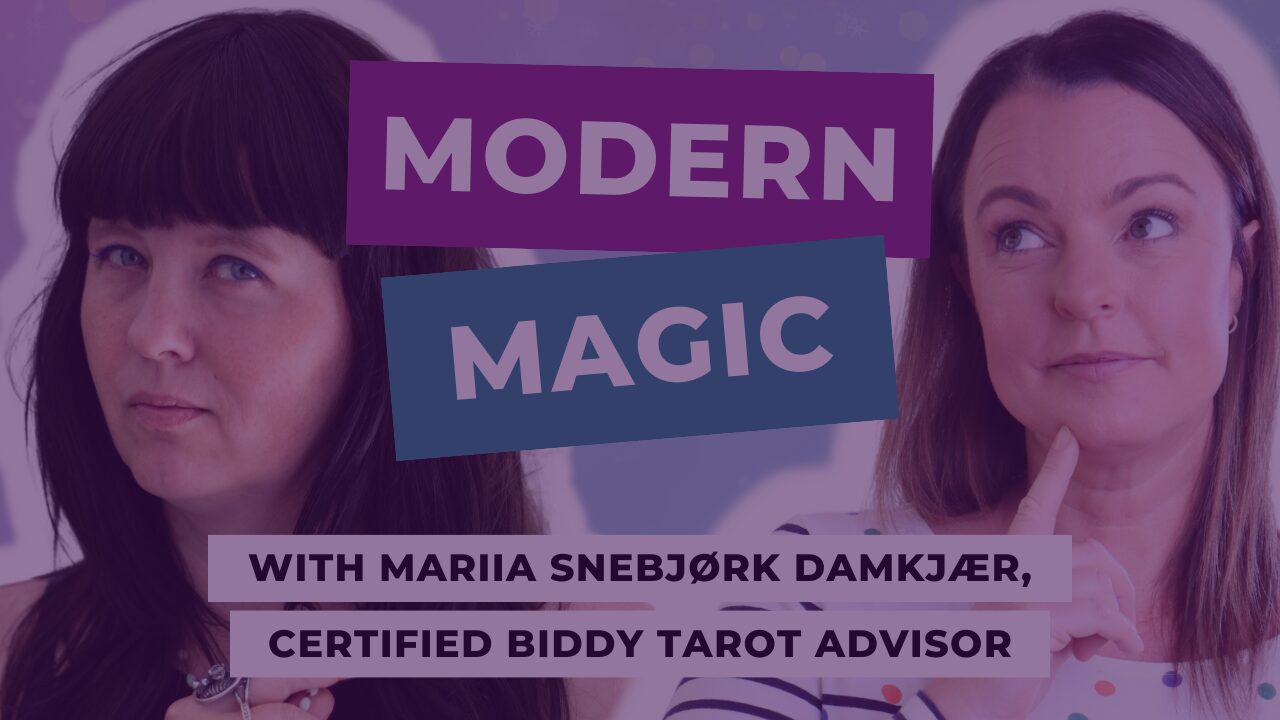
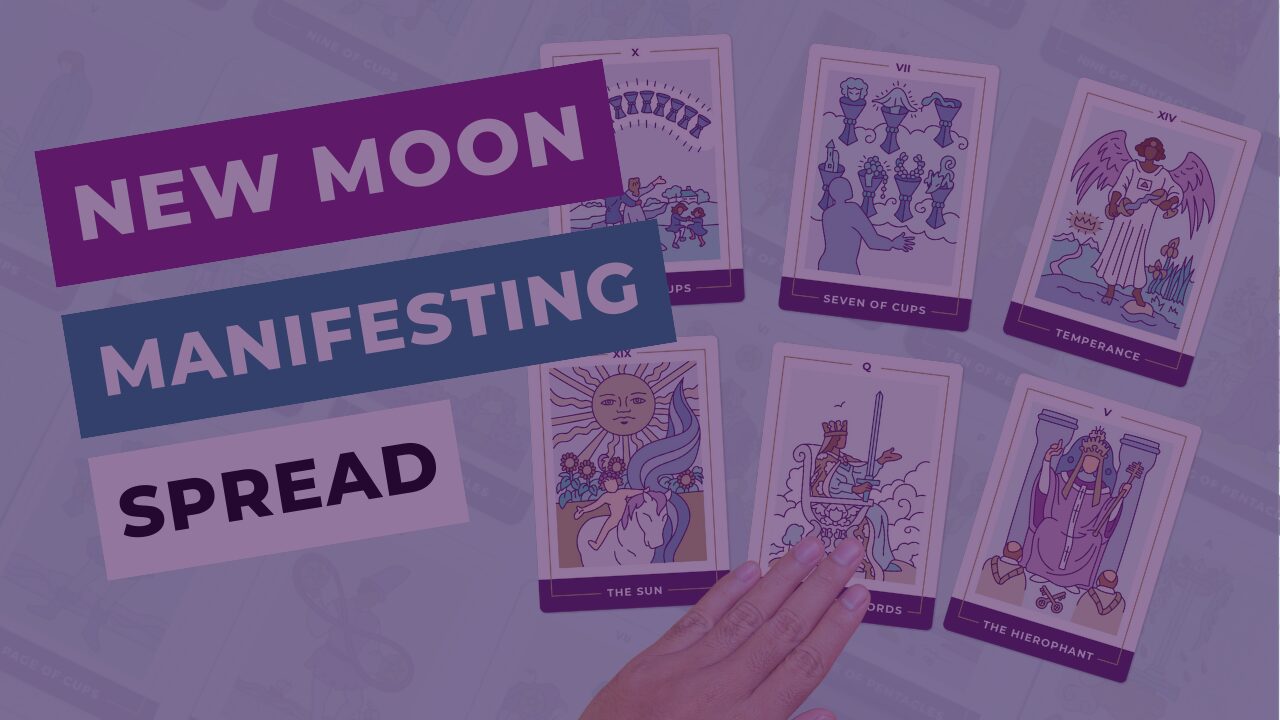
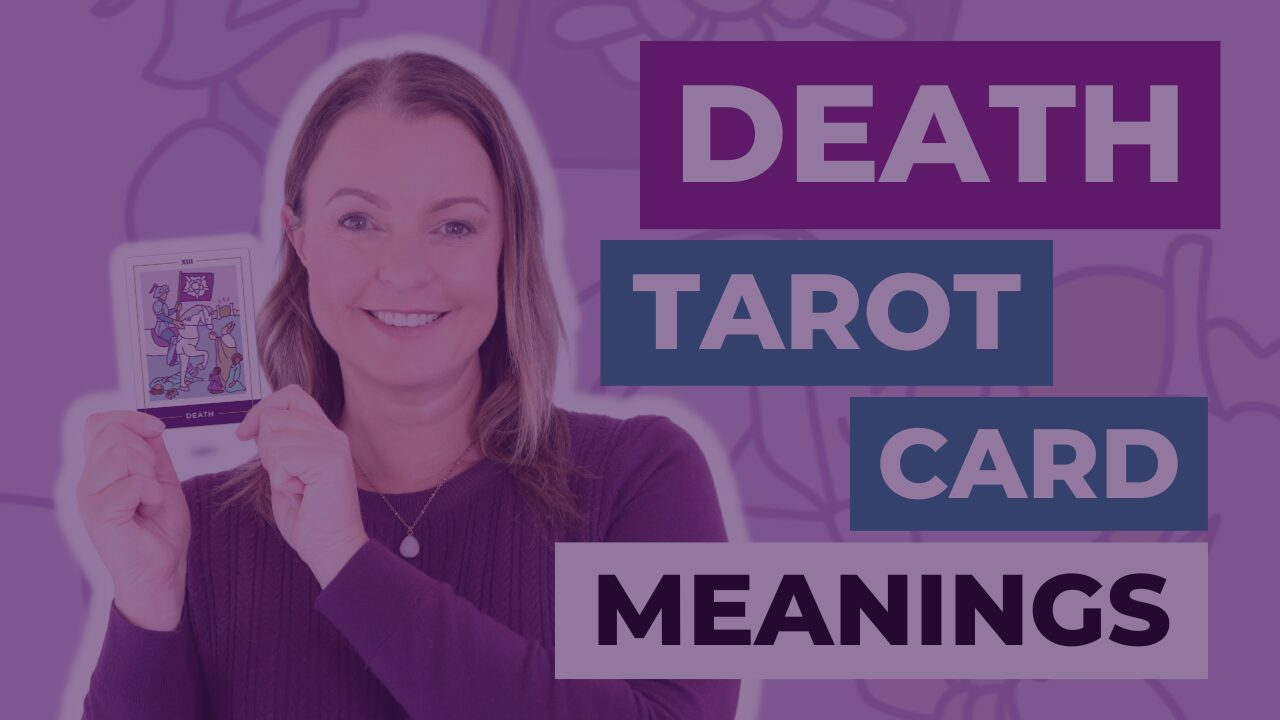
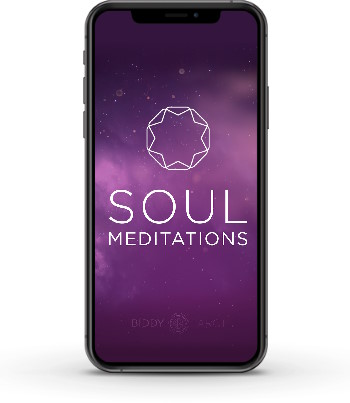 Harness the wisdom of the Major Arcana with 22 guided meditations. Here’s what you’ll get:
Harness the wisdom of the Major Arcana with 22 guided meditations. Here’s what you’ll get: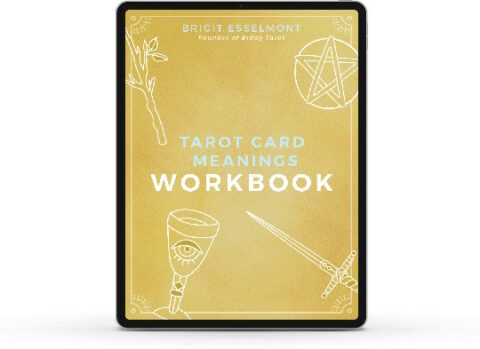 Create a deeply intuitive and personal connection to the Tarot cards with your very own Tarot Card Meanings Workbook. Here’s what you’ll find inside the workbook:
Create a deeply intuitive and personal connection to the Tarot cards with your very own Tarot Card Meanings Workbook. Here’s what you’ll find inside the workbook: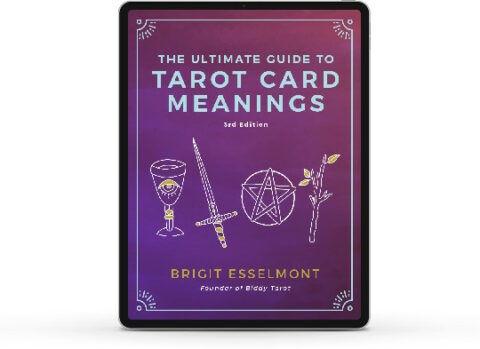 Here’s what you’ll find inside for every card in the deck:
Here’s what you’ll find inside for every card in the deck: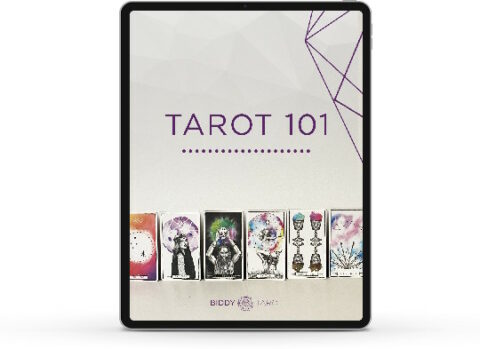 Start doing deep, accurate readings TODAY with this step-by-step accelerated program for beginners.
Start doing deep, accurate readings TODAY with this step-by-step accelerated program for beginners.